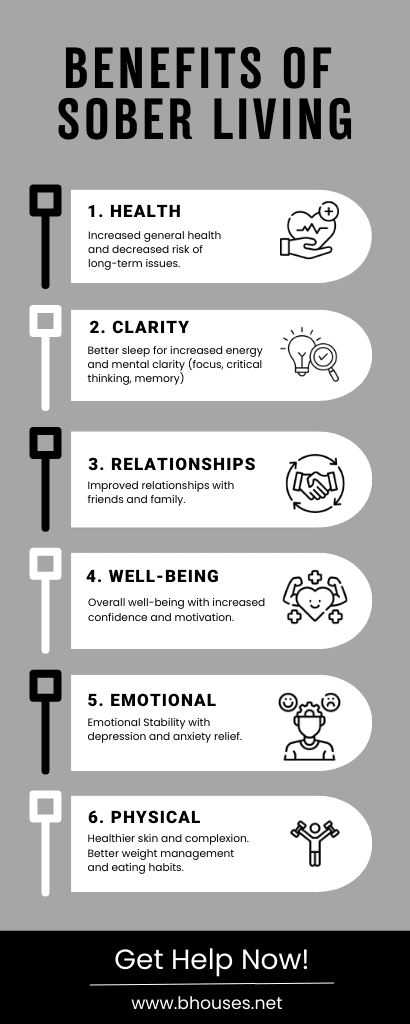In a world that often glamorizes indulgence and excess, the concept of sober living may seem unappealing or even dull. However, what many people don’t realize is that living a sober lifestyle comes with various benefits that can enhance your overall well-being and happiness. So, if you’re curious about the benefits of sober living that you probably didn’t know about, you’ve come to the right place.
In this blog, we will explore the top five benefits of sober living. From improved physical health and mental clarity to stronger relationships and increased productivity, you’ll discover how sobriety opens the doors to a multitude of positive changes in your life. We’ll also delve into the ways in which sober living can boost your self-confidence, help you achieve your goals, and provide a sense of pride and fulfillment.
So, if you’re considering a sober lifestyle or simply want to broaden your knowledge, join us as we uncover the hidden treasures of sober living. Prepare to be surprised by what you’ll learn!
What is Sober Living?
Sober living, often referred to as sober houses or transitional housing, provides a supportive living environment for individuals recovering from addiction. It acts as a crucial bridge between inpatient treatment and independent living, offering a structured and nurturing space to solidify newfound sobriety and develop crucial life skills.
But What Exactly Is It?
Imagine a safe haven, a community of peers who understand your challenges and celebrate your triumphs. That’s essentially what sober living offers. These residences provide:
- Drug- and alcohol-free environment: Eliminating triggers and temptations is crucial for early recovery. Sober living removes these risks, fostering a safe and secure atmosphere.
- Peer support: Surrounding yourself with individuals who share your experiences creates a powerful support system. You can connect, share struggles, and celebrate victories together, fostering accountability and a sense of belonging.
- Structured living: Sober living typically sets rules and expectations, including curfews, chores, and participation in recovery activities. This structure provides the stability needed to rebuild healthy routines and habits.
- Essential resources: Many homes offer access to therapists, relapse prevention programs, and holistic wellness activities, addressing various aspects of recovery beyond just abstinence.
But the benefits extend far beyond these basics:
- Improved mental and physical health: Sober living encourages self-care and provides tools to manage stress and emotions, leading to overall well-being.
- Stronger relationships: Rebuilding trust and learning healthy communication skills allows you to reconnect with loved ones and form positive new relationships.
- Financial responsibility: Budgeting workshops and guidance on money management equip you with the skills to achieve financial stability in recovery.
- Employment support: Some homes offer job training, resume assistance, and connections to career opportunities, empowering you to become self-sufficient.
- Long-term success: By acquiring life skills and building a strong foundation, sober living increases your chances of achieving a lasting and fulfilling recovery.
Remember: Seeking help is a sign of strength, and sober living can be a transformative step on your journey to a brighter future free from addiction.
The Importance of Sober Living After Addiction Recovery
Emerging from addiction treatment is a momentous victory, but the journey to lasting sobriety doesn’t end there. Sober living homes stand as vital stepping stones, bridging the gap between treatment and independent living while bolstering your chances of long-term success. Here’s why:
1. Shielding Against Relapse:
- Trigger-Free Zone: Sober living creates a safe haven, free from the temptations and stresses that could trigger a relapse. Surrounded by supportive peers and clear boundaries, you can focus on healing and rebuilding.
- Accountability & Structure: Consistent rules, curfews, and expectations provide a stable framework, fostering healthy routines and accountability that counter addictive behaviors.
2. Building a Support System:
- Peer Connection: You’re not alone. Sharing your journey with individuals who understand your struggles fosters empathy, camaraderie, and a sense of belonging, which are crucial for sustained recovery.
- Mentorship & Guidance: Many homes offer access to experienced mentors or therapists who provide personalized support, helping you navigate challenges and develop coping mechanisms.
3. Empowering Independence:
- Life Skills Training: Learning budgeting, meal prep, and daily chores builds valuable life skills and fosters a sense of self-sufficiency, preparing you for independent living.
- Employment Support: Some homes offer job training and career resources, empowering you to achieve financial stability and a sense of purpose.
4. Holistic Well-being:
- Physical & Mental Health: Many homes prioritize activities like exercise, meditation, and stress management, nurturing your overall well-being and aiding in healing the underlying causes of addiction.
- Relapse Prevention: Workshops and education equip you with practical tools and strategies to identify and avoid triggers, increasing your confidence in managing your sobriety.
5. Beyond the Benefits:
- Reduced Anxiety & Stress: The supportive environment and structure offered by sober living can significantly reduce anxiety and stress, two major relapse triggers.
- Strengthened Relationships: Rebuilding trust and healthy communication skills with loved ones becomes possible, fostering a supportive network outside the sober living community.
- Increased Self-Esteem: Witnessing your progress and developing life skills boosts your self-esteem, empowering you to face challenges with confidence.

BENEFITS OF SOBER LIVING
The Physical Benefits of Sober Living
Sober living offers a crucial stepping stone on the path to recovery, but its benefits extend far beyond simply staying abstinent. While the mental and emotional improvements are undeniable, the impact on your physical health can be equally transformative. Dive into the incredible ways sober living empowers your body to heal and thrive:
A Foundation for Well-being:
- Healthy Habits Take Root: Regular meals, consistent sleep schedules, and reduced stress replace chaotic, substance-fueled routines. This structured environment nourishes your physical foundation for optimal health.
- Nutrition Gets Real: Access to balanced meals and guidance on healthy eating habits fuels your body with the right nutrients, boosting energy levels and overall well-being.
- Exercise Becomes a Friend: Many sober living communities promote physical activity through group workouts, gym memberships, or outdoor adventures. Moving your body helps manage stress, improves sleep, and strengthens your physical resilience.
Combating the Toll of Addiction:
- Improved Sleep Quality: Saying goodbye to substance-induced sleep disruptions allows your body to enter deep, restorative sleep cycles, essential for physical and mental healing.
- Strengthened Immune System: Eliminating toxins and adopting healthy habits empowers your immune system to fight off illness and disease more effectively.
- Reduced Risk of Chronic Conditions: By addressing the underlying physical consequences of addiction, like malnutrition and liver damage, sober living sets the stage for a healthier future.
The Ripple Effect of Wellness:
- Increased Energy Levels: As your body heals and regains its natural rhythm, you’ll experience a surge in energy, allowing you to engage in activities and hobbies you may have once neglected.
- Enhanced Appearance: Improved sleep, nutrition, and reduced stress manifest in healthier skin, brighter eyes, and a renewed sense of vitality.
- Overall Health Transformation: The positive physical changes triggered by sober living create a snowball effect, motivating you to make even healthier choices and experience holistic well-being.
Sober living is an investment in your future, not just in terms of sobriety, but also in terms of your physical health and well-being. By prioritizing a healthy lifestyle within this supportive environment, you unlock a brighter, healthier you.
The Mental and Emotional Benefits of Sober Living
Living a sober lifestyle can bring about profound mental and emotional benefits that contribute to overall well-being and quality of life. Here are one of the key advantages:
- Clarity of Mind: Sobriety allows individuals to think more clearly and make rational decisions without the influence of drugs or alcohol. This clarity of mind can lead to improved problem-solving skills, enhanced cognitive function, and better overall mental acuity.
- Emotional Stability: Substance abuse often leads to mood swings, anxiety, depression, and other mental health issues. Sobriety can help stabilize emotions, leading to a greater sense of emotional well-being, inner peace, and resilience in the face of life’s challenges.
- Improved Relationships: Sobriety fosters healthier and more meaningful relationships with family members, friends, and loved ones. By eliminating the negative behaviors associated with substance abuse, individuals can rebuild trust, communicate more effectively, and enjoy deeper connections with others.
- Increased Self-Esteem: Sobriety allows individuals to reclaim their sense of self-worth and self-respect. By overcoming addiction and taking control of their lives, they develop a greater sense of confidence, pride, and accomplishment.
- Greater Life Satisfaction: Sobriety enables individuals to fully engage in and enjoy life’s experiences without the haze of drugs or alcohol. They can pursue their passions, set and achieve goals, and find fulfillment in meaningful activities that contribute to a sense of purpose and fulfillment.
- Enhanced Stress Management: Substance abuse often serves as a maladaptive coping mechanism for dealing with stress and emotional pain. Sobriety equips individuals with healthier coping strategies and resilience to manage stress more effectively, leading to greater emotional stability and well-being.
- Improved Mental Health: Sobriety can lead to significant improvements in mental health conditions such as depression, anxiety, PTSD, and bipolar disorder. By addressing the root causes of these issues and seeking appropriate treatment, individuals can experience relief from symptoms and enjoy a higher quality of life.
Overall, embracing a sober lifestyle can have transformative effects on mental and emotional well-being, leading to greater happiness, fulfillment, and resilience in all aspects of life.
The Social Benefits of Sober Living
Stepping out of addiction treatment is a courageous first step, but transitioning back to daily life can be daunting. Sober living communities bridge this gap, offering much more than just a safe haven to stay sober. They provide a fertile ground to rebuild and nurture crucial social connections, fostering a sense of belonging and empowering you on your recovery journey.
The Power of Belonging:
- Breaking Isolation: Addiction often leads to withdrawal and isolation. Sober living provides a supportive community of individuals who understand your struggles and celebrate your victories, fostering a sense of belonging and shared purpose.
- Peer Support Network: Surrounding yourself with peers who share your experiences creates a powerful support system. You can connect, share challenges, and celebrate victories together, fostering accountability and encouraging continued sobriety.
- Healthy Social Interactions: Sober living promotes positive social interactions through group activities, shared meals, and outings. This interaction helps develop healthy communication skills and rebuild healthy social bonds.
Rebuilding Relationships:
- Restoring Trust: Rebuilding trust with loved ones after addiction can be challenging. Sober living provides a stable environment where you can demonstrate your commitment to recovery, fostering opportunities to rebuild trust and mend relationships.
- Learning Healthy Communication: Many programs offer workshops and therapy sessions focused on communication skills, conflict resolution, and emotional intelligence. These tools equip you to develop and maintain healthy relationships outside the sober living community.
- Setting Healthy Boundaries: Setting and enforcing healthy boundaries is crucial for recovery. Sober living provides a safe space to practice establishing these boundaries in a supportive environment, preparing you for navigating social situations independently.
Expanding Your Social Circle:
- Meeting New People: Sober living exposes you to a diverse group of individuals with similar experiences and goals. This allows you to expand your social circle beyond those immediately associated with your past life, fostering new friendships and connections.
- Developing Social Skills: Social events, workshops, and group activities help you develop social skills through practice and positive interaction. This empowers you to engage confidently in various social settings.
- Building Positive Support Network: The connections you build in sober living can become a lifelong support network, offering encouragement and resources even after you transition to independent living.
Remember: Sober living isn’t just about staying sober; it’s about reclaiming your life. By fostering a supportive social environment and equipping you with essential skills, these communities empower you to rebuild healthy relationships, expand your social circle, and build a fulfilling future, free from addiction.
Sober living and Relapse Prevention
Emerging from addiction treatment is a significant victory, but the journey to lasting sobriety continues beyond rehabilitation. Sober living communities bridge the gap between treatment and independent living, offering a crucial layer of support and structure that significantly reduces the risk of relapse. Here’s why:
Building a Strong Foundation:
- Reduced Exposure to Triggers: Sober living environments eliminate readily available drugs and alcohol, minimizing exposure to temptations that could trigger cravings.
- Structured Routines & Accountability: Consistent schedules, curfews, and house rules provide stability and accountability, replacing chaotic patterns associated with addiction.
- Peer Support & Positive Influence: Surrounding yourself with individuals actively committed to recovery creates a network of support and shared experiences, fostering motivation and positive reinforcement.
Developing Essential Skills:
- Relapse Prevention Strategies: Many programs offer education and workshops on recognizing triggers, developing coping mechanisms, and managing stress – key tools for avoiding relapse.
- Life Skills Training: Budgeting, cooking, healthy habits, and communication skills are taught, empowering individuals to navigate daily life independently and confidently.
- Positive Communication & Conflict Resolution: Learning healthy communication and conflict resolution skills fosters positive relationships and reduces the risk of relapse triggered by interpersonal issues.
Promoting Emotional Wellness:
- Holistic Approach: Many programs incorporate therapy, support groups, and mindfulness practices to address underlying emotional and mental health concerns that contribute to addiction.
- Stress Management Techniques: Techniques like meditation, yoga, and exercise equip individuals with healthy ways to manage stress, a major relapse trigger.
- Improved Self-Esteem & Confidence: Witnessing progress and developing life skills boosts self-esteem and confidence, making individuals less susceptible to relapse due to low self-worth.
Beyond the Immediate Benefits:
- Transition Assistance: Sober living provides a gradual reintegration into society, offering support and guidance as individuals find employment, housing, and rebuild their lives.
- Long-Term Support System: The connections and skills gained in sober living communities often evolve into long-term support networks, offering ongoing encouragement and resources.
- Increased Success Rates: Studies show that individuals who participate in sober living programs experience significantly higher rates of sustained sobriety compared to those who transition directly back into their previous environments.
While not a guaranteed solution, sober living offers a powerful tool in the fight against relapse. Its supportive environment, skill development opportunities, and focus on emotional well-being empower individuals to build a strong foundation for lasting recovery.
Conclusion
In conclusion, the benefits of sober living extend far beyond simply abstaining from substances—they provide the foundation for a healthier, more fulfilling life. From improved physical health and mental clarity to strengthened relationships and financial stability, sober living offers a comprehensive approach to rebuilding your future.
At Bhouses, we understand the challenges of recovery and offer a supportive, structured environment to help you thrive. Whether you’re looking to regain control of your life or build a strong foundation for long-term sobriety, Bhouses is here to guide you every step of the way. Experience the life-changing benefits of sober living and take the first step toward a brighter, healthier future.











